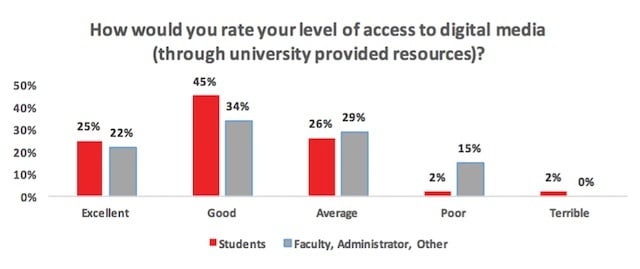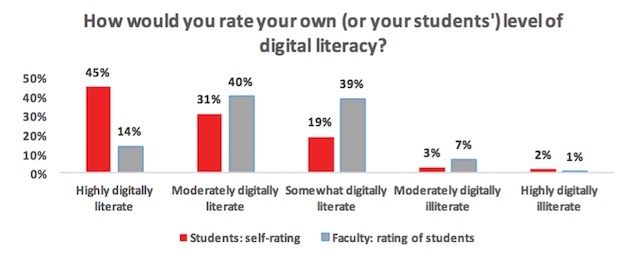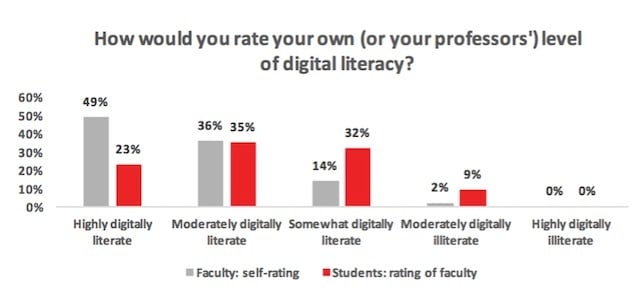The 2016 State of Digital Media in Higher Education
digital literacy competency vs. each other’s



Digital Literacy for St. Cloud State University



April 4, 2016 Christine Wolff, Alisa B. Rod, Roger C. Schonfeld http://sr.ithaka.org/?p=277685
The scholar-centric nature of the questionnaire ensures that potential changes in research and teaching inform our thinking, not only about academic libraries and scholarly publishing, but about changes in the educational enterprise more broadly.
My note:
By showcasing the diminishing role of physical presence and the increasing research using online methods, this study clearly proves that the 4/5 years debate if the reference librarians must sit on that desk (and answer the most popular question “where is the bathroom”) is futile.
What the study does not show, since it is conducted in its traditional (conservative) form, is that the library is NOT only the traditional library, where faculty and student search for information (being that in its physical appearance or in online access), but the library entails services, very close to the ones offered by IMS.
I see a discrepancy between literature (where libraries compel much more proactive approach regarding services) and the structure of this survey, which focuses on the traditional (conservative) role of the library as a gatekeeper to online resources [only]. Besides entrenching in 90’s practices of information literacy and/or “dressing up” old-fashioned information literacy with the new cloths of “digital literacy”as I witness at my workplace, the faculty must have been surveyed on the skills in metaliteacies, which the library can [must] provide, as per literature.
Does music help learn better? get smarter? advance in life?
keywords: music, education, intelligence.
Misra, S., & Shastri, I. (2015). Pairing Linguistic and Music Intelligence. International Journal Of Multidisciplinary Approach & Studies, 2(5), 32-36.
Costa-Giomi, E. (2015). The Long-Term Effects of Childhood Music Instruction on Intelligence and General Cognitive Abilities. Update: Applications Of Research In Music Education, 33(2), 20-26.
Juchniewicz, J. (2010). The Influence of Social Intelligence on Effective Music Teaching. Journal Of Research In Music Education, 58(3), 276-293.
Silvia, P. J., Thomas, K. S., Nusbaum, E. C., Beaty, R. E., & Hodges, D. A. (2016). How Does Music Training Predict Cognitive Abilities? A Bifactor Approach to Musical Expertise and Intelligence. Psychology Of Aesthetics, Creativity, And The Arts, doi:10.1037/aca0000058
Rickard, N. S., Bambrick, C. J., & Gill, A. (2012). Absence of Widespread Psychosocial and Cognitive Effects of School-Based Music Instruction in 10-13-Year-Old Students. International Journal Of Music Education, 30(1), 57-78.
Munsey, C. (2006). Music lessons may boost IQ and grades. American Psychological Association, 37(6), 13.
Schellenberg, E. G. (2011). Music lessons, emotional intelligence, and IQ. Music Perception, 29(2), 185-194. doi:10.1525/mp.2011.29.2.185
Kaviani, H., Mirbaha, H., Pournaseh, M., & Sagan, O. (2014). Can music lessons increase the performance of preschool children in IQ tests?. Cognitive Processing, 15(1), 77-84. doi:10.1007/s10339-013-0574-0
Degé, F., Kubicek, C., & Schwarzer, G. (2011). Music lessons and intelligence: A relation mediated by executive functions. Music Perception, 29(2), 195-201. doi:10.1525/mp.2011.29.2.195
Sharpe, N. N. (2014). The relationship between music instruction and academic achievement in mathematics. Dissertation Abstracts International Section A, 75.
keywords: music, education, multimedia.
Crappell, C., Jacklin, B., & Pratt, C. (2015). Using Multimedia To Enhance Lessons And Recitals. American Music Teacher, 64(6), 10-13.
le Roux, I., & Potgieter, H. M. (1998). A Multimedia Approach to Music Education in South Africa.
http://www.literature-map.com/
a tool for your personal enjoyment and your students’…
Classified revisions accepted by secret Fisa court affect NSA data involving Americans’ international emails, texts and phone calls
The FBI has quietly revised its privacy rules for searching data involving Americans’ international communications that was collected by the National Security Agency, US officials have confirmed to the Guardian.
Pro Domo Sua: Are We Puppets in a Wired World? Surveillance and privacy revisited…
More on privacy in this IMS blog:
https://blog.stcloudstate.edu/ims/page/2/?s=privacy&submit=Search
more on surveillance in this IMS blog:
https://blog.stcloudstate.edu/ims/?s=surveillance&submit=Search
Nice outline of the presidential candidates views on K12
The major party hopefuls still in the race as of last week boasted widely varied records and stances on K-12. (Download as a PDF.)
Related: How Meaty Are the Presidential Candidates’ Online K-12 Positions?
| Location | Call Number | Status |
| St. Cloud State University MC Main Collection – 2nd floor | D421 .H582 1994 |
http://www.nybooks.com/articles/2003/11/20/the-last-romantic/
http://librev.com/index.php/scribbbles-essays-publisher/2921-2016-02-15-09-21-11
Class ED 610 Introduction to Curriculum and Instruction Summer 2018
Instructor: Hsuehi(Martin) Lo
short link to this session: http://bit.ly/edad829
for online participation, please use the following Zoom or Adobe Connect session (your instructor will direct you which one:
My name is Plamen Miltenoff and I will be leading your digital literacy instruction today: Here is more about me: http://web.stcloudstate.edu/pmiltenoff/faculty/ and more about the issues we will be discussing today: https://blog.stcloudstate.edu/ims/
As well as my email address for further contacts: pmiltenoff@stcloudstate.edu
Here is a preliminary plan. We will not follow it strictly; it is just an idea about the topics we would like to cover. Shall there be points of interest, please feel free to contribute prior and during the session.
Keeping in mind the ED 610 Learning Goals and Objectives, namely:
lets review our search and research skills:
https://www.semanticscholar.org/
+++++++++++++
PICO framework to structure a question:
Population, Patient, Problem
Intervention
Comparison
Outcome

What is a DOI? A Digital Object Identifier (DOI) is assigned to electronic journal articles (and selected other online content) to specifically and permanently identify and access that article. Most of the standard academic citation formats now require the inclusion of DOIs within a citation when available.
How to find a DOI: Most current academic journal articles include a DOI (usually listed on the first page of the article). Most library databases list a DOI with the record for recent academic journal articles. Most non-academic articles (including magazine and newspaper articles) as well as many older academic journal articles do not have a DOI. Crossref.org provides a DOI Lookup service that will search for a DOI based on citation information (author’s last name, journal name, article title, etc.).
How to access an article via a DOI: Use the CSU Stanislaus Library DOI Look-up for options provided by the library, including access to the full-text via the publisher’s site or a library database service when available. Other, general DOI look-up systems (CrossRef & DOI.org) usually link to the article’s “homepage” on the publisher’s site (which usually include a free abstract but full-text access is restricted to subscribers).
shall more info be needed and or “proper” session with a reference librarian be requested. http://stcloud.lib.mnscu.edu/subjects/guide.php?subject=EDAD-D
-Strategies for conducting advanced searches (setting up filters and search criteria)
Filters
+++++++++++++++++
Search criteria
++++++++++++++++
Social media and its importance for the topic research and the dissertation research:
Small business owners use social media primarily as a marketing and search engine optimization tool. However, more and more small businesses are using social media to get answers for business related questions. Specific industry related articles, and statistics are found useful for small business owners in 80% of the cases.
https://www.linkedin.com/today/post/article/20140331225132-25026422-small-business-owners-turning-to-social-media
Altmetrics: https://blog.stcloudstate.edu/ims/2017/10/23/altmetrics-library-lily-troia/
Other sources for information:
https://blog.stcloudstate.edu/ims/2017/01/27/research-how-to/
Blogs – use tags
learn how to use Zotero and/or Refworks in Microsoft Word

and/or
Refworks and/or Mendeley in Google Docs 
Login into ProQuest Refworks AddOn for Google Doc:
Zotero, Mendeley, Refworks
Evernote, Diigo
If Twitter, Facebook or LinkedIn, use hashtags
—————-
Plamen Miltenoff, Ph.D., MLIS
Professor
320-308-3072
pmiltenoff@stcloudstate.edu
http://web.stcloudstate.edu/pmiltenoff/faculty/
pedagogues under a minute: http://www.pinterest.com/pin/178173728981990450/
Plan
———–
————————————
More on presentations in this IMS blog:
free image sources:
https://blog.stcloudstate.edu/ims/2014/06/01/social-media-and-presentations-free-image-sources/
Presentation tools for teachers:
https://blog.stcloudstate.edu/ims/2014/07/09/2014-best-educational-web-sites/
Basics of design:
https://blog.stcloudstate.edu/ims/2013/01/22/basics-of-design/